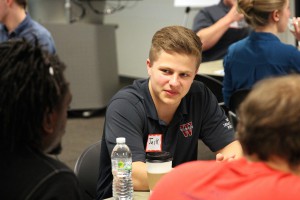by Deonte Simpson, ’18
It was an awesome opportunity to work with the class of 2019 as we discussed mental health here at Wabash College. This dialogue is based off President Obama’s community conversations on mental health program that began in the fall of 2013. That year, a Wabash tutorial group created a mental health dialogue as their course project. Several members of that tutorial group are now WDPD Fellows, and having more fellows this year, we asked Ms. Heather Thrush if we could run a dialogue on men’s mental health for the freshmen class.
During the dialogue, the freshmen class really bought into the idea that the hypothetical students we presented were facing issues Wabash men encounter everyday. In turn, this made for a much more productive discourse in which we talked about how to respond to our fellow students. Working on this project, my mind was blown at the fact that mental health is more than being diagnosed with a disease or disability. These were my preconceived notions on the subject prior to conducting research on mental health. The freshmen responded similarly as I did in the beginning of the conversation, so I was happy to be there and help them work through these issues and make them aware of resources they have available on campus, such as the Wabash Counseling Center.
The WDPD Fellows really contributed big time to the first of this two-day event producing a positive turnout, so I commend each and every one of you. I also want to give a huge thank you again to Kevin Swaim and Jamie Douglas from the Wabash Counseling Center. It is important that students know about you here on campus. We all admit the institution is challenging, and we need a person to turn to when we feel overwhelmed and in distraught. It was challenging developing the framing for this conversation, but we created a smooth plan for action.
A huge takeaway from working with the WDPD Fellows and the Counseling Center is that it has really helped me develop my ability to work efficiently in a team. Sometimes working with a peer or colleague in office hours can spark a more interesting idea. Once we (the WDPD Fellows) all get together and begin bouncing ideas off one another, I have noticed this is when we are most effective. Everyone brings a unique quality to the table, and together we create well researched, thought-out projects that can make a difference.
